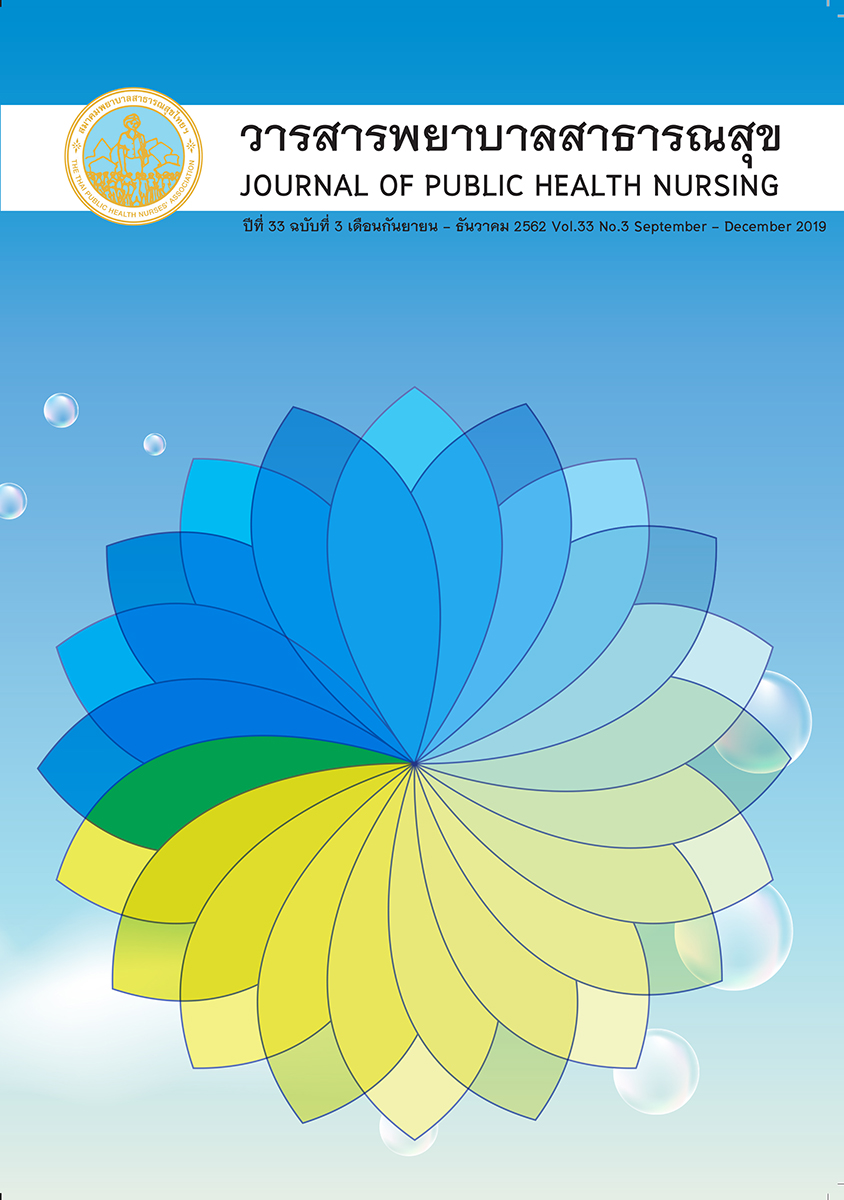The effect of a health promoting program on adherence behaviors among patients with stage 1-2 Chronic Kidney Disease
Keywords:
Health promotion program, Chronic kidney disease, Protection motivation, Self-care behavior, AdherenceAbstract
The chronic kidney disease is an incurable disease. The Health promotion will help prolong the kidney degeneration. This Quasi-experimental study was aimed to study the effects of a health promotion program on health behaviors among patients with stage 1-2 chronic kidney disease. A sample was selected from the outpatients Siriraj Hospital. The samples were divided into two groups each 30 patients which the study was conducted between January to May 2016. The experimental group received a health promotion program. The activities were divided into 5 times as follows: one time individual education, one time home visit, and three times telephone visit. Data was collected using the questionnaires before and after the experiment and were analyzed by using percentage, mean, standard deviation, Chi-square, Fisher's exact test, paired t-test, and independent t-test.
The findings showed that the experimental group had higher scores of awareness of the severity, the risk of complications, the expectation of health behaviors result, self-efficacy, and health behaviors than before the experiment and than those in the comparison group statistically significant (p<0.05). It was suggested that heath education home and phone call visit should be applied to patients with Chronic Kidney Disease.
References
The nephrology society of Thailand. Clinical Practice Recommendation for the Evaluation and Management of Chronic Kidney Disease in Adult; 2015.
Coresh J, Astor, BC, Greene T, Eknoyan G, Levey AS. Prevalence of chronic kidney disease and decreased kidney function in the adult US population: Third National Health and Nutrition Examination Survey. American journal of kidney diseases 2003; 4(1): 1-12.
Thanakitcharu P. Current Situation of Chronic Kidney Disease in Thailand. Journal of the Department of Medical Services 2015; 5(1): 5–18.
Ingsathit A, Thakkinstian A, Chaiprasert A, Sangthawan P, Gojaseni P, Kiattisunthorn K, et al. Prevalence and risk factors of chronic kidney disease in the Thai adult population: Thai SEEK study Nephrol Dail Transplant 2010; 25(5): 1567-75. (in Thai)
The Nephrology Society of Thailand. Guide to managed care for chronic kidney initial stage patients. The Nephrology Society of Thailand & The National Health Security 2012. Bangkok: Union ultraviolet; 2012.
Hung WW, Ross JS, Boockvar KS, Siu AL. Association of chronic diseases and impairments with disability in older adults a decade of change?. Med Care 2012; 50(6): 501-7.
Mahatnan N, Rotphai S. Counseling for renal replacement therapy. In Eiamong S, Susantitaphong P, Srisawat N, Tiranathanagul K, Praditpornsilpa K, Tungsagna K, edtors. Textbook of hemodialysis. Nakhon Pathom ai Printing; 2007.
.
Supasyndh O. Nutrient and metabolic alteration in diabetic dialysis patient: Management of diabetic patient with chronic kidney disease. Annual Conference; 2007 May 12-13; Thai Nephrology Nurses Association. Prince Palace Hotel Bangkok, Thailand; 2007. 1-9.
Maneesri S. Factors influencing selfmanagement behaviors in patients with chronic kidney disease. Vajira Nursing Journal 2011; 13(1): 14-27. (in Thai)
Bore H, Seydel ER. Protection Motivation Theory. In M. Conner, P. Norman edtors. Prediction Health Beheavior. Hong Kong: Open university Press; 1998. 95-117.
Supanikorn C, Thiangtham W, Boonyamalik P. The Application of Protection Motivation Theory in Promoting the Behaviors Slowing Down the Progression of Degeneration of CKD Stage 3 Patients in a Community. Nursing Journal of the Ministry of Public Health 2019; 29(2): 165-77. (in Thai)
Medical record. Medical statistical record unit Medical record, Siriraj hospital; 2016.
Cohen J. Statistical Power Analysis for Behavior Science. 2nded. New Jersey; 1988.
Klyprayong P. Effectiveness of health education program in promoting health behavior for slow progression of chronic kidney disease to the end stage renal disease among chronic kidney disease stage 3 and stage 4 at Out Patients Department, Ramathibodi Hospital. Journal of Phrapokklao Nursing College 2008;19(2):49-60.
Pilit DF, Hungler BP. Nursing Research: Principles and Methods. 5th ed. Philadelphia: Lippincott; 1999.
Mackay BC. Aid and Protective Motivation Theory: Effective of Imagined Scenarios on Intention to Use Condom. UMI Dissertation Service printers;1992.
Boongun N, Dungsong R. Effects of Health Education Programs by Application of the Protection Motivation Theory and Social Support to Prevent Kidney Disease among Hypertensive Patients. Srinagarind Medical Journal 2012; 27(4): 316-72. (in Thai)
Mano A. The Effectiveness of the Application of the Protection Motivation Theory and Social Support in Hypertension Prevention Program Among Middle -aged Men in Bangkok Metropolitan. Journal of Boromarajonani College of Nursing Bangkok 2012; 28(1): 46-59. (in Thai)
Phungsomboon O. Primaryhypertension prevention program for high risk population in a community Nakornprathom province. Journal of Nursing Science Chulalongkorn University 2010; 22(1-3): 11-28. (in Thai)
Downloads
Published
How to Cite
Issue
Section
License
บทความที่ตีพิมพ์และแผนภูมิรูปภาพถือเป็นลิขสิทธิ์ของวารสารพยาบาลสาธารณสุข (Thai Public Health Nurses Association)







